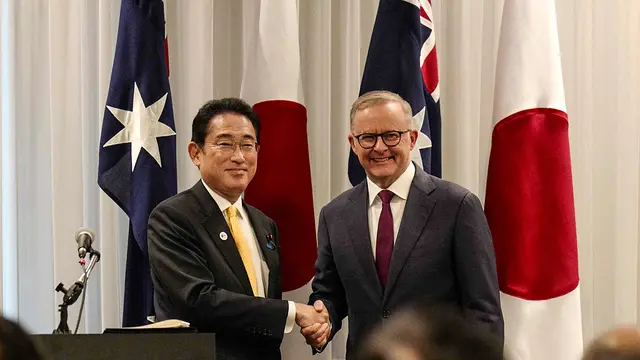On October 22, the prime ministers of Australia and Japan signed a bilateral security agreement to address unspecified risks over their "shared values and mutual strategic interests." The joint declaration would boost military, intelligence and cyber-security coordination over the next decade, while endorsing the controversial "free and open Indo-Pacific" strategy's containment focus. The latter strategy could subvert Asia Pacific's time-tested cooperation architecture and is a recipe to split regional consensus through ideological alliances and an alternative "rules-based order." Consequently, there is nothing strictly bilateral about the new Australia-Japan security pact. The endorsement of the "free and open Indo-Pacific strategy" is cause for regional alarm.
The genuine deterrence against regional threats requires credible assurance from the region itself. Tokyo and Canberra miss the mark by addressing broad "behavior" that "undermines international rules and norms" in their eyes. Both countries also interpret regional security interests as their own closed prerogative, as indicated by their tacit approval of U.S. interests in the freedom of navigation and joint military exercises space.
There is a conscious effort to put a security lens on dispute resolution mechanisms in the Pacific. The region remains rich with mechanisms and dispute resolution practices that are in accordance with international law, untethered to what Japan and Australia collectively signal as an alternative "rules-based order."
The security pact deserves greater scrutiny since it proposes continuity in actions that contradict peaceful dispute settlements in the region. The underlying geopolitics is also difficult to miss. It supports the achievement of a "favorable strategic balance" in the region, and prioritizes the fulfillment of Australia and Japan's own "vision for the Indo-Pacific," while casting a shadow over commitments to boost "regional resilience," particularly when the pact does not mirror priorities of the region at large.
The joint advocacy for freedom of navigation operations (FONOPs) and sophisticated military exercises would carry negative overtones for peace in Asia. Both risk unwarranted coercion and instability in the maritime domain, as witnessed in recent times. Genuine freedom of navigation should be sensitive to established maritime rights and cannot serve as the judgement of a few countries keen to sail at will. The United States – seen as "critical" to trilateral cooperation under the pact – has exploited FONOPs to advance maritime provocations in sovereign waters and continues to enlist Japanese and Australian support for future continuity.
But it's the entire region – not select partners – that get to collectively coordinate peace through representative dialogue. "Our bilateral partnership also reinforces our respective alliances with the United States that serve as critical pillars for our security, as well as for peace and stability of the Indo-Pacific," read the Joint Declaration on Security Cooperation (JDSC). By choosing to coordinate Australia-Japan security engagement with an eye on U.S. interests, there is greater likelihood that all three states will operate in lockstep with each other as regional autonomy emerges on the back burner. The involvement of all three states under the Quadrilateral Security Dialogue (Quad) grouping is a fitting illustration in itself.
The impression that Australia and Japan have also been working to achieve a free and open Indo-Pacific under an "increasingly severe strategic environment" deserves interrogation. It ignores the role of both powers in heightening regional threat perceptions by subscribing to closed cliques and bloc groupings. Expect no miracles on the nuclear front as well. Both Australia and Japan have made tall promises to uphold the Nuclear Non-Proliferation Treaty (NPT) under the pact. That is a poor sell considering how Australia has welcomed nuclear submarines with open arms and escalated future risks of an arms race in the region.
The pact is an upgrade of the 2007 Joint Declaration on Security Cooperation between both countries, which provided an opening for troop coordination and military exercises that have increased maritime provocations in sovereign waters, as observed in the South China Sea. By refusing to heed the right lessons from history, while intensifying the risks of regional volatility, would suggest that Japan and Australia are rushing ahead on a collision course with the very region that they claim to protect.
(CGTN)
 简体中文
简体中文

